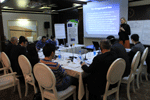Training on Gender-Responsive Budgeting, Budget Analysis and Policy Advocacy
Published on Thu, 2014-03-13 10:27
The training on Gender-Responsive Budgeting, Budget Analysis and Policy Advocacy was organized for experts of National Budget Group (NBG) in Baku last February under the project: “Your Money, Your Future: Improving Public Finance Policy and Management in Azerbaijan”. The purpose of the training was to increase the awareness and knowledge of civil society experts about the public finance policy analysis and writing capacity, policy advocacy, gender-responsive budgeting and provide them with relevant information on the concept, tools and practices. The training was facilitated by three professional international consultants, Katrin Schneider, Gabriel Lara and Dr. Paul Copeland. The second session facilitated by Gabriel Lara, mainly focused on SMART Framework understanding and use of it in advocacy objectives, Budget process as the road map for budget advocacy, Stakeholder analysis and identification of decision-makers – What, When and Who. Dr. Paul Copeland, facilitated the third session on policy advocacy, providing an understanding of the Advocacy Planning Framework, identifying and analyzing budget for advocacy, researching the issue and gathering information, setting objectives, developing an advocacy strategy (I) – target identification, developing an advocacy strategy (II) – resources and allies, creating an action plan. The training aimed to present advocacy in a broad sense. Although there are many different ways to conceptualise advocacy, this training focused on advocacy directed at changing the policies, positions or programs of any type of institution – a small NGO, a ministry of health, a national parliament, an international agency or any other kind of organization. Dr. P. Copeland developed a new advocacy strategy for NBG. During the training, Kenan Aslanli, NBG Coordinator also made presentations on Introduction of the Budget Process in Azerbaijan, introduction of the Budget Process in Azerbaijan based on OBI online tool. Furthermore, the Consultants provided advice and tips to the experts of National Budget Group on ways of promoting evidence-based policy making approach, to draw up a gender strategy to be implemented in each action and policy paper, and develop mechanisms to ensure women’s voice is heard in state budget programs a new draft of the strategy for the project, explicitly elaborating advocacy issues, target audiences, internal capacity and relevant advocacy tools and guidelines. In conclusion the results of the evaluations indicate that the participants considered the training program to be well organized and well taught. Furthermore, they also indicated that the newly acquired knowledge would help them in their current positions. In this respect the training program has been well tailored to the needs of the situation in Azerbaijan and I am satisfied with the final outcome. |


